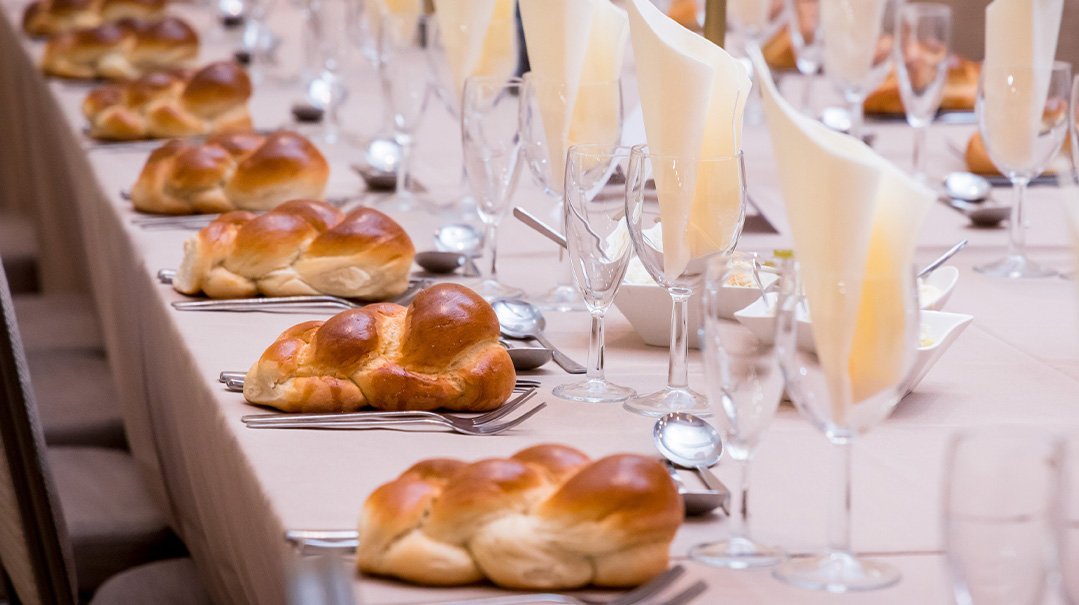Meet… Yehudis Sherman
| May 28, 2024Yehudis Sherman makes sure that no divorced woman faces life alone

From a mother of nine, Yehudis became a mother to hundreds when she opened her heart and home to host divorced women for Shabbos and Yom Tov through her organization, Mishpachteinu.
After raising nine children and marrying off four of them, I never thought becoming single again was even a possibility. But it happened, and my husband and I got divorced. I’m a positive person, and while I try to see the good in everything that happens in my life, finding the silver lining in the aftermath of my divorce was a struggle.
I distinctly remember my first Purim as a single mother. My kids weren’t with me for the seudah, and the pain of my empty home threatened to swallow me. Determined not to let my loneliness get the better of me, I’d invited six women in similar situations to join me for the seudah. I’d thrown myself into the preparations and patchkeh’d for days, hoping the distraction would help me find a bit of the simchah so integral to that time of year.
But as the day drew closer, one by one the women I’d invited explained that something had come up and they wouldn’t be able to make it. Purim day came, my table set with a feast — and there I sat, alone. One woman came over to wish me a freilechen Purim. She took one look at my face — and I burst into tears. I remember crying and davening to Hashem, “Please, don’t ever let me be this lonely again.”
Like I said, I try to see the good in every aspect of my life, but in that moment the pain pierced straight through my heart. My cries, however, must have pierced the Heavens, because since that Purim, my house has never been empty, and I’ve never been alone again.
That Purim was the catalyst for my founding Mishpachteinu. I had to understand what loneliness was. I had to experience complete aloneness to embark on the mission Hashem had in mind for me.
Humble Origins
It all began with two Shabbos guests. I invited two women who were divorced to join my kids and me for the seudos, since I knew what it was like to be alone for Shabbos. I did my best to make them feel at home.
The next week, they asked if they could come again and bring a few friends with them. One of those guests told me that her first week at my house was the first Shabbos she’d had since getting divorced. Shabbos was too painful for her, with the crushing loneliness and lack of devices to keep her mind off the pain, so she’d just sleep.
While I knew the need for women spending Shabbos alone to have a place to go was real, I didn’t realize at first how widespread it was. Within a few weeks, I was having 20-30 women over every Shabbos. Eventually, I founded an official organization, which I called Mishpachteinu, “Our Family.”
Shabbos Queens
As the guest list grew with every week, so did my Shabbos plans. I now have an entire Shabbos program. My preparations begin the minute Shabbos is over, when I prepare the candles for the following Shabbos. I prepare for Shabbos every day of the week, setting the table early, doing my grocery shopping, setting the rooms up hotel-style for women who don’t live close by and need to sleep over, and cooking up a storm. By the time Shabbos comes, I have set an elaborate tablescape — different and exciting every week — with fresh challos, 20 dips, four types of fish, dishes for every dietary and medical specification… whatever the women can dream of, I make sure to have on my Shabbos table.
Every week I prepare a theme revolving around the parshah, Yom Tov, or a foundational hashkafah, and I arrange a program of uplifting speakers and singers. We learn the Zera Shimshon together and sing beautiful zemiros. At my Shabbos table, every woman is a queen with a crown.
There’s No Place like Home
I’m highly allergic to negativity. If you walk through my front door, it means you have experienced the trauma of divorce, but Mishpachteinu is not a place where we share our problems with each other. Trust me, each woman has enough problems to last a lifetime. My goal is to foster an environment of warmth, love, and acceptance, with all negativity left at the front door.
Some of the women even call me Mommy! Don’t get me wrong, many of my guests do have loving family members and friends. But while their friends and family care deeply for their loved one grappling with divorce, it’s hard to empathize with someone when you haven’t experienced a similar struggle yourself.
At Mishpachteinu, everyone feels understood. Everyone feels like they belong.
The women come from all over the country — Crown Heights, Monroe, Baltimore, Los Angeles, the Five Towns, and they range from about 20-65 years old. The age differences don’t matter. At Mishpachteinu, everyone finds a place of understanding and acceptance that transcends external characteristics.
Over Shabbos we focus on building our emunah, bitachon and simchah. You can’t begin to imagine the impact these Shabbosim have on the women. Mishpachteinu is a place where women forget their challenges, a place where they can bask in the glow of Shabbos and feel true simchah.
Beyond the Shabbos Table
Mishpachteinu is more than an organization — it’s a family, there all year round to meet the needs of women struggling with the reality of a divorce. I host the women for all the Yamim Tovim, and we have a Chanukah party and weekday events like painting classes and spa days. One time I took the women to the Shevy salon, and every woman received a massage, a facial, a professional makeover, and had their wig styled. It was incredible.
At the first Chanukah party I hosted, I wanted each woman to walk out with a beautiful gift, as they don’t have a husband to buy them a Chanukah present. I walked into many stores in Boro Park to see if they would donate, fully expecting them to say, “no, thank you.” What happened blew my mind. Almost every store I entered gave me a gift certificate, up to $1,000! This tradition continues on to this very day, and every woman walks out with a beautiful gift, a gift certificate, and toys for their kids.
I also have a “pantry” for women to access. One Friday night, as I was finishing up the last-minute preparations in the kitchen, a woman rushed in and told me I must make Kiddush right away, someone felt faint. A little while later I asked the woman who wasn’t feeling well what had happened. “I pay the bills and rent,” she told me, “and I barely have anything left to buy food. My fridge is empty. I wait all week for your food.”
After, I told a few friends about this incident, and together we decided to stock up a “pantry” for women to take what they need.
Managing on Miracles
I see Hashem’s hand all the time in everything I do. While running the organization requires a lot of time, resources, and expenses, the continuous miracles I’ve experienced let me know that this is what He wants from me. In the early days of Mishpachteinu, the Shabbosim weren’t as large as they are today. One week, before I could blink, I had a guest list that included 40 women. I went shopping for everything I would need, but I had no idea how I would fit it in the refrigerator.
On Thursday night, as I was staring at my overflowing countertops, someone called me on behalf of a friend and asked if I had room for one more guest. “I definitely have enough food for her,” I said. “I have so much food I have no idea where to put it.” Five minutes later the woman called me back — she’d just ordered me a second refrigerator.
Small miracles happen, too. The first time a woman came to me for a Shabbos she told me that she loves a particular dip. I had someone who donated 20 dips every week, but for years she’d never brought that dip. Lo and behold, the next week, in her usual delivery, the woman’s favorite dip was there. Hashem helps me get whatever I need to make Mishpachteinu the sanctuary it is for these women.
Dream for the Future
Just like there is a Hatzalah and Shomrim in every city, my dream is that one day there will be a Mishpachteinu in every city. It’s an achrayus on our community to make sure women aren’t sitting at home alone crying for an entire Shabbos. I also dream that I could buy a bigger house, with many bedrooms, so I can host even more women on a weekly basis.
His Plan All Along
For decades before I started Mishpachteinu, I was involved in kiruv around the world, including St. Louis, Cleveland, and Vienna, Austria. I would host up to 50 people for a Shabbos. I learned how to be a hostess right from the beginning. While I didn’t know it at the time, Hashem was preparing me to start Mishpachteinu and be there for these women.
(Originally featured in Family First, Issue 895)
Oops! We could not locate your form.







